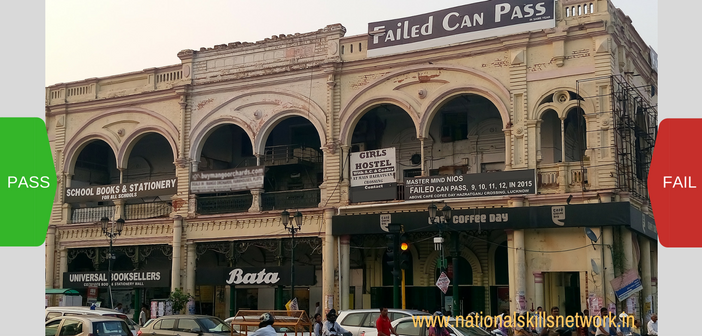If a picture is worth a thousand words, then, the picture used in this article speaks a million words about our examination-centric education system that’s built on elimination rather then inclusion. In a recent visit to Lucknow, where I saw all the shops were branded uniformly in black and white in Hazratgunj area, the “Failed can pass” message simply stood out. We see such advertisements and messages everyday; there’s nothing new or peculiar about it. But the message that’s getting conveyed repeatedly needs new and broad ways of perceiving failures and dropouts in the academic space. Let’s look 5 possible ways to re-think how best we can avoid discrimination and penalty for so-called non-achievers and failed students in schools and colleges.
 Failure in an exam could be a beginning of something new
Failure in an exam could be a beginning of something new
Why do students fail? Reasons could be many – lack of interest in the subjects, the way it is taught through schooling, lack of financial resources to get tutored (since private tuitions have become mandatory), lack of family support for studies, human frailty or just non-conformance – the list could be long. How often do we think of an instance of failing as an indication something less of stigma and more of a new way to look at the so-called inabilities. This could mean creating options and opportunities for multiple definitions of ‘passing’ and being ‘successful’ and acknowledging them.
Beyond a second chance
Even though we have distance learning, open schooling, e-learning, mobile learning and a host of similar avenues, it is difficult to address the social aspects of failing and the following consequences. Many failed students try hard pass the exams in the subsequent attempts or by take a different route just to be on par with other and get the benefits. They succeed through a second chance but they hardly get time to think and reflect on why they’ve failed in the first place. Are they even being made aware of it?
Dropouts or daredevils
We love to hear success stories of rich and famous like a Bill Gates of a Dhirubhai Ambani who did not have to prove to the world by passing many scholastic tests and exams. However, in reality many failed students are either tagged as dropouts or shown the familiar or tried and tested path to reach the same goals of acquiring degrees and diplomas. Given the right support and environment, many dropouts could actually have the potential to redefine what it means to successful in life, to be on their own, provided they discover their true strength.
If Pass = success, then is Fail = disaster?
None of these equations make sense in the larger perspective of learning, performance and productivity. And definitely not the dichotomy. Real life expectations at workplace are totally different from what we formally learn.The rigid way of defining success in terms of academic qualifications or professional designations is terribly old-fashioned. What matters is creating equitable opportunities irrespective of passing or failing an exam. Tough to think this way right? What with all of us being products of an exam-centric system of education which works more by elimination than by inclusion.
Overcoming fear of failure
What is the right time to inculcate a positive feel about failure in children? We have all grown up fearing failure and we continue to drive the same message to our kids. Look at the popular perceptions of failure – not being able to score a certain number or marks in an exam, not being able to perform consistently in all the tests, not being able to…. What about other achievements where significant learning takes place even if it was not demonstrated through numbers? Parents and teachers need to be a lot more relaxed in grooming the kids.
On a personal note
What set me thinking what I saw this advertisement in Lucknow was a three-decade old incident of my personal ‘failure’ in a short vocational exam due to some negligent information shared by the institute. The episode was dramatic and it took few days for the institute to cross check my result and later I got to know that I really ‘passed’ the exam with distinction. The director of the institute apologized saying I was the first candidate who got a distinction and till then they never bothered to check that list! What happened during the intervening days will remain with me forever. I cannot forget the pain of what it meant to have apparently failed in an exam – my parents’ reaction, my inability to tell my friends about my results and above all the disbelief in myself.
Since then, not much has changed in our perception of failure in examinations, mainly because the common notion of education is always equated with performance in exams. Of course, we’ve been creating many parallel systems to accommodate and qualify the failed students through various tests, assessments and certifications. Perhaps this is needed to survive in a system that demands a proof of academic achievements. Now, combine this with the complexity, enormity and diversity of our country!
Nothing stops us from being open to accepting the fact that failure is a fact of life, a part of the learning process and it could really mean a stepping stone to success – a success that need not conform to the popular notions or fulfill a set of expectations.












